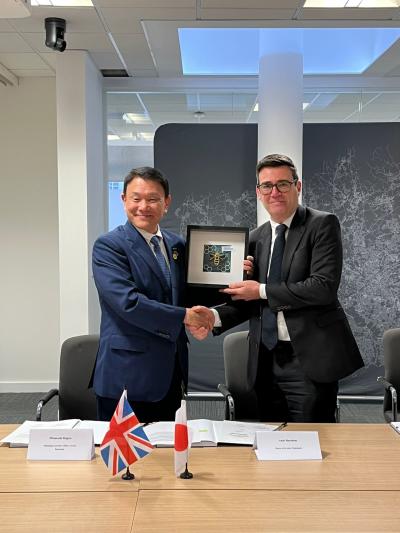- Greater Manchester signs new exploratory partnership agreement with Panasonic to tackle carbon emissions through deployment of innovative green technology
- Mayor of Greater Manchester signs agreement alongside representatives from Panasonic, SSE Energy Solutions, Electricity North West, Manchester Metropolitan University and Carlton Power
- Agreement will explore opportunities to harness green hydrogen and fuel cells to supply 100 percent renewable electricity, supporting Greater Manchester‘s ambition to be carbon neutral by 2038
- The partnership will strengthen research and innovation clusters in Greater Manchester by connecting people, ideas, and sectors

Greater Manchester’s net zero ambitions have been given a major boost by a new partnership with tech giant Panasonic to deploy innovative hydrogen fuel cell technology across the city-region.
Mayor of Greater Manchester, Andy Burnham, and Mitsutoshi Shigeta, Managing Executive Officer of Panasonic Corporation, Chief Green Transformation Officer (CGXO), signed the agreement on Monday 15 January.
They were joined by representatives from SSE Energy Solutions, Electricity North West, Manchester Metropolitan University and Carlton Power in signing the memorandum of understanding (MoU).
Through the new partnership, Greater Manchester Combined Authority (GMCA) will work with Panasonic to explore the deployment of the company’s RE100 technology at sites across Greater Manchester, including hospitals, in what are set to be the first real use cases in the UK.
SSE Energy Solutions will work with the partners to identify potential trial sites and provide energy infrastructure and generation required, Electricity North West, as the regional power network operator, will oversee the connection to the grid with enhancements and integration to the existing network, and Manchester Metropolitan University (Manchester Met) will contribute leading research and knowledge in the hydrogen and fuel cell industry. Carlton Power plans to provide green hydrogen from its Trafford scheme, which has been backed by the GMCA and was offered financial support from the UK Government in December 2023.
RE100 harnesses green hydrogen and fuel cells to supply 100 percent renewable electricity in industrial and public sector settings. The partnership, which is in place for five years, aims to strengthen research and innovation clusters by connecting people, ideas, and sectors, and to create jobs, attract investment, and drive growth – all of which will support Greater Manchester’s goal of becoming carbon neutral by 2038.
To mark the signing of the new partnership, a delegation from Panasonic and GMCA also visited Manchester Met’s world-leading Manchester Fuel Cell Innovation Centre.
Mayor of Greater Manchester, Andy Burnham, said:
“The partnership we’ve agreed today puts Greater Manchester at the forefront of groundbreaking new technology to reduce carbon emissions. I’m excited for a future where our hospitals and businesses are powered through 100 percent renewable energy, making a positive difference to the city-region and the daily lives of Greater Manchester residents.
“Collaboration and innovation will be vital if we are to succeed in our ambition to be carbon neutral by 2038, and this partnership proves the benefits of our international approach to delivering net zero.
“Working with Panasonic and our other partners will also provide a strong foundation for more opportunities to bring green jobs, skills, and investment to Greater Manchester.”
Managing Executive Officer (CGXO) and Vice President/Energy Business, Electric Works Company of Panasonic Corporation, Mitsutoshi Shigeta, said:
“I highly appreciate Greater Manchester’s strong willingness to collaborate with us on the projects that will help achieve decarbonisation by 2038. It is realised by the Greater Manchester delegation visiting our RE100 solution in Panasonic Kusatsu site (new energy solution using hydrogen fuel cells) in Japan last December, to see our decarbonisation efforts and understand our vision and initiative.
“We believe that we are able to make a wide range of contributions to Greater Manchester's Carbon Neutral target in 2038 as a global company with the products and solutions that can contribute to decarbonisation and energy saving, beginning from hydrogen fuel cells.
“We will work closely with the Greater Manchester Combined Authority and three companies and one research institution to accelerate this activity to deliver more concrete decarbonisation projects in Greater Manchester.”
Director of the Manchester Fuel Cell Innovation Centre at Manchester Metropolitan University, Amer Gaffar, said:
“Manchester Met has supported the hydrogen opportunity for Greater Manchester for over a decade in line with the city regions ambition of becoming Net Zero by 2038.
“The MoU signed today has intensified the cooperation on hydrogen as an energy vector that will spur innovation and develop an international hydrogen market. As frontrunners in developing hydrogen technology, the new partnership will create opportunities for research and innovation together with ensuring the region benefits from sustainable and affordable hydrogen energy.”
Regionalisation Director at SSE Energy Solutions, Nehal Mehta, said:
“At SSE Energy Solutions we are passionate about supporting regions like Greater Manchester and accelerating their journey to carbon neutrality. This initiative aims to not only reduce carbon emissions but also foster innovation and collaboration by connecting research and development clusters in Greater Manchester by bringing together key stakeholders.
“We are committed to creating a collaborative ecosystem that drives meaningful change. As a leading renewables energy and infrastructure provider we are excited about contributing to Greater Manchester's sustainable future and working closely with partners to ensure the success of this transformative initiative.”
Strategy and Growth Director at Electricity North West, Ben Grunfeld, said:
“As the region’s electricity network operator, we’ve provided expert advice and support as a partner with Greater Manchester Combined Authority for many years and are fully aligned with the region’s vision for net zero.
“Our world-class innovation and engineering expertise fits perfectly with the ambition of the region as together we lead the way internationally for a cleaner, greener future. This project is just an example of things to come as we leverage our global relationships for the good of the North West.”
Carlton Power is developing its green hydrogen project and a battery storage scheme at its Trafford Low Carbon Energy Park, located next to the Manchester Ship Canal.
Carlton Power Hydrogen Projects Director, Eric Adams, said:
“Developing and investing in low carbon energy technologies is critical if Greater Manchester, and indeed the UK as a whole, is to achieve its Net Zero ambitions.
“Taking a collaborative, partnership approach, like Greater Manchester’s agreement with Panasonic, can help address the technical, economic and social challenges with the transition to Net Zero, and so will crucially help all of us to realise the abundant opportunities that Net Zero offers us today and in the future.”
The agreement follows the landmark mission to Japan in December 2023, when Greater Manchester became the first UK city-region to lead a Mayoral mission to the country since the Government signed a Free Trade Agreement in 2020, projected to boost trade between the countries by £15.7 billion over the next 14 years.
Rachel Eyre, Head of Inward Investment for Advanced Manufacturing and Low Carbon commented:
Japan continues to be a key market for Greater Manchester and our December visit has yielded brilliant results.
Our collaboration with Japanese companies such as Panasonic, is crucial to help our city-region achieve net carbon neutrality by 2038. Their innovative research and development to create and adopt new technologies contributes heavily to our strategy for long-term energy efficiency, and we’re excited to see the impact on our local economy in coming years.
The Greater Manchester delegation visited Panasonic’s Kusatsu site in Japan, where they saw a demonstration of the RE100 technology, which combines pure hydrogen fuel cell generators and photovoltaic generators.
During the mission Greater Manchester also agreed a major bilateral partnership with Osaka to strengthen links in trade, investment, and net zero innovation.

